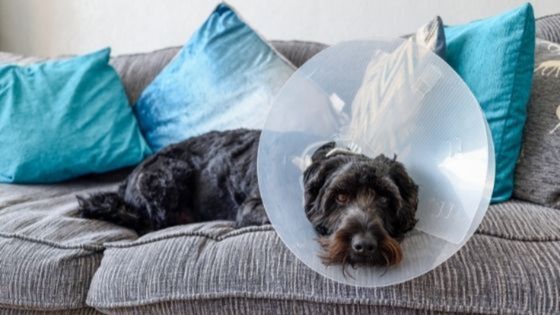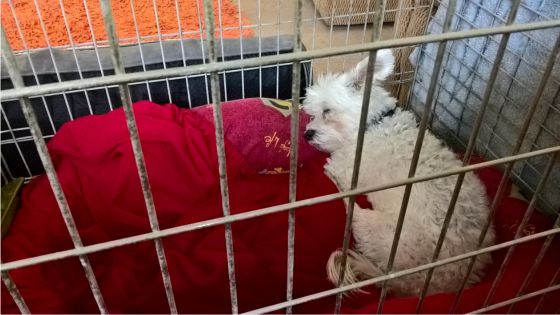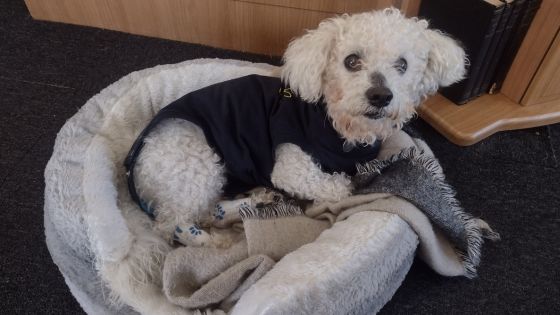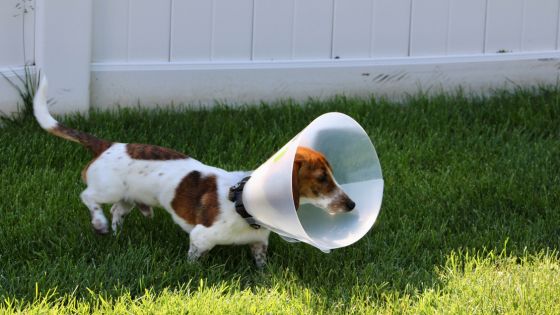If like me you’ve had an old dog undergo surgery, you know how restless or anxious they can be afterwards.
Just like humans are confused when waking up from anesthesia, so are dogs. Some of the ways we can help them recover is speaking to your vet if you suspect pain, taking him out often enough for pee and poop breaks, keeping him entertained while on cage rest with puzzle toys and snuffle mats, or providing an e collar that won’t be too annoying to wear.
*There are affiliate links in this post, which means if you make a purchase I may receive a small commission. This does not change the price for you, but will allow me to continue bringing you helpful content.*
Why Your Dog May be Restless/Anxious After Surgery
Confusion
The most common reason is the grogginess and confusion that comes when anesthesia wears off. It happens to humans of course, but dogs don’t understand what’s going on, so are often scared and anxious.
General confusion and grogginess should get better in a day or two, but if there’s no improvement, please call your vet.
Pain
If your dog is in pain then we expect to see restlessness, anxiety, whimpering or barking. Sufficient pain medication would have been given at your vet’s office, and is sometimes sent home when your dog is discharged. Having said that, it is possible there is still some discomfort.
When your dog was sent home, your vet should have spoken to you about an after-surgery care plan. That includes medication your dog may need, special diet, ways to keep him comfortable, amount of exercise he’s allowed, when you can expect to see improvement and the like. If this didn’t happen, please call your vet and have a list of questions ready for when you speak to him or her.
Ask about Arnica. My vet recommended it for one of my dogs after dental surgery to help the recovery process.
Not Feeling Well
They may not be experiencing pain, but may feel nauseous or generally unwell. In this case your doctor could prescribe anti-nausea medication.
Not Getting Out Enough to Pee/Poop
Depending on the type of surgery your dog is recovering from, he may not be able to get out as often as needed. If walking is difficult, he can’t get to the door to let you know as he’s done in the past. Take him out regularly to avoid accidents, especially if he’s on a medication that causes increased urination.
Wants Attention
I’m sure at some point during a training class, the trainer gave you this or a similar example. When your dog is barking and you give him a treat, tell him to stop or even yell, the only thing you’re doing is teaching him barking gets your attention…which it does.
This could be what’s happening in this case as well.
If your dog is whining or whimpering, it’s natural to go over and pet him and pay him extra attention. After all, he’s recovering from surgery and you’re so grateful he’s back home with you. The thing is, just like in the example above, you’re teaching him it’s rewarding so he’ll keep doing it.
Your dog needs lots of love and attention but…you want it to be on your terms. Sit next to him, keep him company but do it before he asks!
NOTE: You need to be careful with this one. You know your dog well, so it will be up to you to figure out if he just wants your attention or needs veterinary intervention. If in doubt, call your vet.
Doesn’t Like Wearing a Cone/E collar

I’m sure I’m not alone in having a dog that hated wearing a cone, or e collar as they are also known. They can’t get to the water bowl easily, have trouble fitting through doors, constantly banging the walls and hard to reach the food.
Make sure your vet, nurse or vet tech shows you how to use it correctly, and follow their instructions. Taking it off prematurely will give your dog access to the stitches and potentially rip them out and cause infection. Ask if you are allowed to remove it at meal time if supervised.
There are alternatives to those huge plastic e-collars. Some cones are made of flexible fabric, we bought a spongy one in the form of a life preserver, or a onesie may work too. If you’d like to try a different style, have your vet, nurse or vet tech check it fits well and is a good alternative for your dog.
He or She Has an Infection
Even though veterinarians do their best to minimize the risk of infection, it can happen. Sometimes infection at the surgical site is obvious, but if it’s deeper in the body it may not be.
Signs of surface infection:
- Swelling
- Discharge
- Warm, angry looking and painful when touched
Signs of a deeper infection:
- Refuses food
- Lethargic
- Vomiting
- Diarrhea
- Laying around, doesn’t want to move
If you have the slightest concern something isn’t right, let your vet know right away. The quicker the problem is diagnosed, the better the chance of a positive outcome.
Doesn’t Like Cage Rest

Your dog may need to be confined to a crate during his recovery, and may not like it one bit!
My dog Jack had spinal surgery, and except for 5-minute walks during the day, he needed cage rest. Luckily we had permission to take him out in the stroller, so he was at least able to breathe fresh air and see people. He had never been crate trained, so we were lucky he adapted well since he needed to be in it for a couple of months. We borrowed this crate from a neighbor who so kindly offered. It looks in pretty rough shape but it was 100% clean and helped so much.
Many dogs struggle, especially if they’ve never been in one before, and that level of anxiety can hinder recovery. Ask your vet if a play pen, exercise pen or even a small area roped off would work instead.
Boredom
During recovery, your dog won’t be going out as often or as long as he used to, he’s stuck in the house for longer periods, he doesn’t see his doggy or human friends in the park anymore…who can blame him for being bored.
Games, puzzle toys and treat dispensing toys are great boredom busters.
This article, “18 Ways to Exercise a Dog Indoors” has lots of ideas for dogs that can’t always go out. Tips will be relevant for all senior dogs, but not all will be suitable for post surgery.
May Be Constipated
Anesthesia can cause constipation, so don’t be surprised if it takes a day or two for your dog to poop. If nothing’s happening, call your vet. He may recommend things like a change in diet or the addition of fibre.
Bandage May Be Too Tight
The bandage may be wrapped too tightly and is uncomfortable, so check the area for swelling. If you’re concerned take a picture, email it to the vet then call and let them know you need an opinion. If you haven’t heard back in a couple of hours, call again.
Thirsty/Hungry
Your dog may be thirsty and hungry, but can’t access his bowls as often as usual.
Attach a water bowl to the inside of the crate, keep one near his bed or bring it over to him regularly. He may not have much of an appetite when he first gets home, so feed small portions throughout the day. Vets often send animals home with an easy to digest food, which your dog may or may not like. Ask if his regular diet is safe, or if you can mix the two.

This picture is of my 11 year old foster dog Milo recovering from surgery. Poor baby was neutered, had a hernia repaired and his dew claws removed. The body suit was a much better option than making him wear a cone. It was a bit of a pain having to roll up the bottom every time he had to pee and poop, but he was definitely more comfortable.
How Senior Dog Parents Help Their Pups Recover from Surgery
Before bringing my pets home after surgery, I speak to the vet about pain medication, as well as tips on making them comfortable. I always found wrapping them in a blanket and sitting with me helped a lot. One time my vet recommended the tiny white Arnica pillules/pellets for a day or two to help with recovery.
Here’s some advice offered by senior dog parents in my FB group
“My dog had major surgery at the age of 15 to have her gallbladder removed. The vet said she had to have a cone on and be in a large crate. I slept on the couch with the crate beside me but she would not stop turning in circles and trying to knock off the cone. She was super restless and neither of us were going to be sleeping. I did some research online and decided to take off the cone and use one of my t shirts knotted at the bottom loosely to put on her. She instantly relaxed and settled down and slept all night. The t shirt did the trick and she wore one until she healed. She also liked having a small fan on her. I’m not sure that was from having the t shirt on and being too warm or the medication. I just know she was panting and we tried everything else but the fan is what helped with that.”
“Our little Twiggy (RIP) had many major surgeries during her life, including a complete leg/knee construction and a splenectomy. She was always calm and settled after each surgery due to appropriate pain relief and drugs to help her relax. She also had someone with her at all times, day and night, so I guess that helped her relax. I don’t know if any of this was helpful but I guess what I’m saying is that appropriate drugs are key to a smooth recovery.”
“If it seems to be from pain I would call the vet. Usually they give a pain shot intra operatively and then you start pain management the next day. If they didn’t you can start pain management.”
I wrote this article “22 Natural Ways to Calm Your Anxious Dog.” Not everything will be relevant for your situation, but hopefully you’ll find some useful tips. Please consult your vet before trying any supplements.
How have you helped your restless dog after surgery? Sharing helps others so please leave your comments below.

Resources
How to Care For Your Pet After Surgery
I help senior dog parents struggling with anticipatory grief and quality of life issues by offering practical tips, advice and one on one support.
I am also a Certified Pet Loss Specialist, helping you navigate through your pet loss journey.
Click this link to book a FREE 20 minute discovery call, visit my service page to find out more or email hindy@greypawsandall.com if you have any questions.
I’ve been rescuing and caring for senior dogs since 2009. From vision and hearing loss to obesity, dementia, kidney disease, liver issues, cardiac problems, Cushing’s, mobility challenges and more, you could say I’ve dealt with and learned a lot! In addition to my hands on experience, I’ve taken many courses and earned several qualifications to keep learning how to help senior dogs and they include: Senior Dog Enrichment, Understanding Canine Anxiety, Care of the Senior Pet and I’m a Certified Pet Loss Specialist.


We sleep near wherever our dogs are recovering so we can be close. I’ve slept on dog beds, in crates, etc. with some dogs. Lots of times, mine find comfort in touch so we do what we have to do to make them feel safe.
You’re absolutely right. Just knowing you’re near them is such a great comfort. If only more dogs ended up in homes with someone who cared as much as you do.
When Henry had emergency eye surgery, he did great with the cone. I minded it more than him. Thank goodness he did so well, because ultimately he had to wear it for 9 months as he healed. He did want to be near me and a lot more loves and cuddles, which was fine with me. Honestly, I think I needed them as well. I also noticed that some dogs recover from anesthesia much better than others. It took Henry a bit to get the anesthesia out of his body and be more himself. Great information on how to care for a senior or any furry buddy after surgery. I’m sharing with my pet parents.
Lucky Henry was so good natured about it, because that’s a very long time to need to wear one. Glad to hear he healed well, eye surgery can be very scary. Just like people recover at different rates, makes sense dogs do as well.
Great post and although Layla never had surgery but being spayed it is great to read and get an insight for the future G-d Forbig, plus your barking point has opened my eyes with Nili, Thanks
Always good to have information, and hopefully it will be many years before you have to think about these tips.
The tight bandage is something I encountered. as soon asI got Harvey home I loosened it to my own satisfaction or I feared he might be so uncomfortable he might come to harm. A lot of what you say should be common sense, in other words know your dog and follow any treatment plan. If in doubt speak to your vet again.
You were so right to loosen Harvey’s bandage. Absolutely so much is common sense, I’m not sure why I questioned whether or not it was okay for me to loosen it without professional guidance. Of course that’s exactly what I did.
Such excellent information, Hindy. I’ve had several of my dogs have surgery as seniors. Naturally, they all never liked the “cone of shame” – even the inflatable type, but I did do crate and with my one Husky, Wolfie, he had such anxiety in the crate, that for the 8 weeks of healing, I had him on a lovely batch of blankets next to me on my bedroom floor and I slept right next to him! Thankfully, they all recuperated well after their surgeries. You have such great info here for things pet parents need to keep an eye out for. Sharing this with my readers!
This is great information, thanks Hindy! It’s interesting to me that a couple of readers had senior dogs who have had surgery, I’m always so afraid of that. It’s also interesting that some folks didn’t keep their dog in a crate because it stressed them out so much. It just proves that we know our pets better than the Vet and Sometimes it’s necessary to selectively ignore that advice.